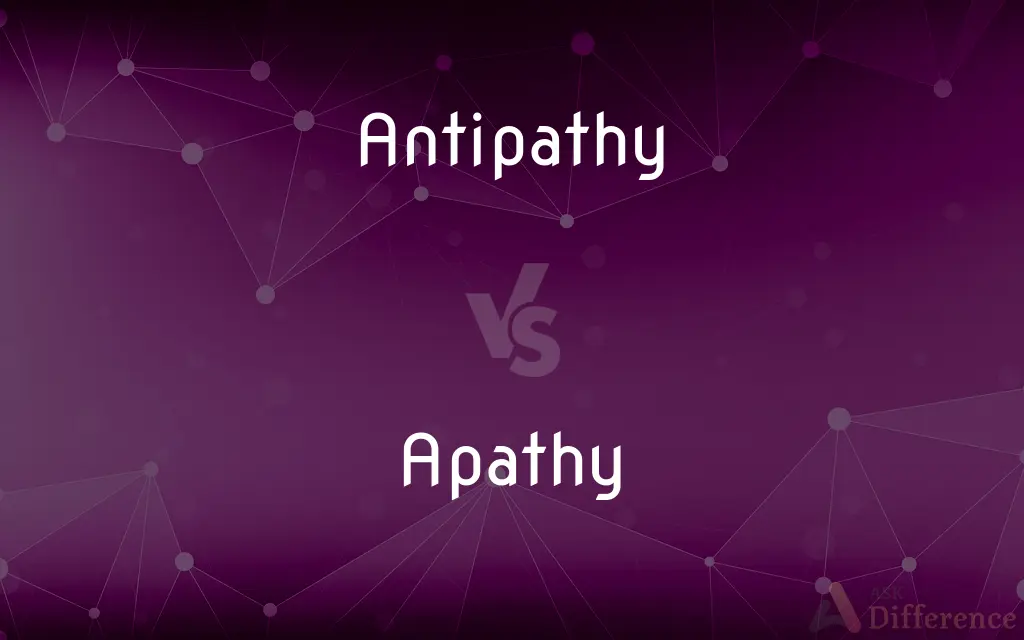Antipathy vs. Apathy — What's the Difference?
By Maham Liaqat & Fiza Rafique — Updated on April 8, 2024
Antipathy denotes strong aversion or dislike towards something, whereas apathy reflects a lack of interest, enthusiasm, or concern about it.

Difference Between Antipathy and Apathy
Table of Contents
ADVERTISEMENT
Key Differences
Antipathy embodies a deep-seated feeling of aversion or hostility towards something or someone. This feeling is usually intense and can manifest as disdain, dislike, or even hatred. On the other hand, apathy is characterized by an absence of emotion or interest towards a particular subject or event. It represents a state of indifference where one is neither moved by feelings of like or dislike.
While antipathy can lead to active avoidance or opposition due to strong negative feelings, apathy results in a passive state where the individual does not feel compelled to act or react. Whereas antipathy can fuel actions or decisions based on strong dislike, apathy often leads to inaction or a lack of response due to the absence of any strong feelings at all.
Antipathy often requires a catalyst or a specific reason for its emergence, such as a past negative experience or a clash of fundamental values. Conversely, apathy might not have a clear cause and can stem from a variety of factors including emotional exhaustion, overwhelming choices, or a general sense of disillusionment.
In relationships, antipathy can cause conflicts, arguments, and a clear expression of dislike between individuals. Meanwhile, apathy might lead to a lack of effort, communication, or emotional connection, creating a void that is difficult to bridge.
In societal contexts, antipathy towards certain policies, ideologies, or social issues can motivate activism and prompt individuals to seek change. On the contrary, apathy towards these same issues can lead to stagnation and a lack of progress, as it results in diminished public engagement and accountability.
ADVERTISEMENT
Comparison Chart
Definition
Strong feeling of aversion or dislike
Lack of interest, enthusiasm, or concern
Emotional State
Negative, hostile
Indifferent, unresponsive
Outcome
May lead to avoidance or opposition
Often results in inaction or lack of response
Common Causes
Negative experiences, value clashes
Emotional exhaustion, overwhelming choices, disillusionment
Impact on Actions
Fuels actions or decisions based on strong dislike
Leads to a passive state with minimal action or reaction
Compare with Definitions
Antipathy
A deep-seated dislike that affects one's choices and actions.
Their antipathy towards each other was evident in every interaction.
Apathy
A condition often stemming from a sense of helplessness or disillusionment.
After years of failed attempts, he approached his goals with increasing apathy.
Antipathy
Negative feelings that are usually directed towards specific entities.
His antipathy towards modern art puzzled his friends.
Apathy
Lack of interest or concern about things that others find moving or exciting.
His apathy towards political debates made him disengaged during discussions.
Antipathy
Intense aversion or opposition to something.
His antipathy for injustice drove him to become a lawyer.
Apathy
Absence of enthusiasm or desire to participate.
Her apathy towards the event led her to stay home instead.
Antipathy
A strong feeling of dislike or hostility.
Her antipathy towards spiders made her avoid the old basement.
Apathy
An emotional state characterized by indifference.
The news of the crisis met with surprising apathy from the public.
Antipathy
Emotional opposition that can lead to active avoidance.
She felt such antipathy for the movie, she walked out halfway through.
Apathy
Indifference that results in inaction or neglect.
The community's apathy towards the voting process was concerning.
Antipathy
Antipathy is a dislike for something or somebody, the opposite of sympathy. While antipathy may be induced by experience, it sometimes exists without a rational cause-and-effect explanation being present to the individuals involved.Thus, the origin of antipathy has been subject to various philosophical and psychological explanations, which some people find convincing and others regard as highly speculative.
Apathy
Apathy is a lack of feeling, emotion, interest, or concern about something. It is a state of indifference, or the suppression of emotions such as concern, excitement, motivation, or passion.
Antipathy
Extreme dislike; aversion or repugnance.
Apathy
Lack of interest or concern, especially regarding matters of general importance or appeal; indifference.
Antipathy
A feeling of aversion
Longstanding antipathies between two nations.
Apathy
Lack of emotion or feeling; impassiveness.
Antipathy
Inherent incompatibility or inability to mix
The antipathy between faith and reason.
The antipathy of hydrocarbons and water.
Apathy
Lack of emotion or motivation; lack of interest or enthusiasm towards something; disinterest (in something).
Antipathy
A feeling of dislike (normally towards someone, less often towards something); repugnance or distaste often without any conscious reasoning.
Apathy
Want of feeling; privation of passion, emotion, or excitement; dispassion; - applied either to the body or the mind. As applied to the mind, it is a calmness, indolence, or state of indifference, incapable of being ruffled or roused to active interest or exertion by pleasure, pain, or passion.
A certain apathy or sluggishness in his nature which led him . . . to leave events to take their own course.
According to the Stoics, apathy meant the extinction of the passions by the ascendency of reason.
Antipathy
Natural contrariety or incompatibility
Oil and water have antipathy
Apathy
An absence of emotion or enthusiasm
Antipathy
Contrariety or opposition in feeling; settled aversion or dislike; repugnance; distaste.
Inveterate antipathies against particular nations, and passionate attachments to others, are to be avoided.
Apathy
The trait of lacking enthusiasm for or interest in things generally
Antipathy
Natural contrariety; incompatibility; repugnancy of qualities; as, oil and water have antipathy.
A habit is generated of thinking that a natural antipathy exists between hope and reason.
Antipathy
A feeling of intense dislike
Antipathy
The object of a feeling of intense aversion; something to be avoided;
Cats were his greatest antipathy
Common Curiosities
Can apathy be considered a defense mechanism?
Yes, apathy can serve as a defense mechanism to protect oneself from emotional distress or overwhelm.
Is antipathy always negative?
While antipathy is a negative feeling, it can motivate positive actions, such as fighting against injustices.
How does antipathy affect interpersonal relationships?
Antipathy can lead to conflicts and a clear expression of dislike, potentially harming relationships.
Can someone feel both antipathy and apathy towards the same thing?
While they are opposite in nature, it's possible for someone to transition between feelings of antipathy to apathy towards something over time.
What role does personal history play in antipathy?
Personal history, including past negative experiences, can significantly contribute to the development of antipathy.
How can apathy affect a community or society?
Apathy can lead to a lack of civic engagement, reduced participation in social issues, and overall stagnation.
Does antipathy require a specific trigger?
Yes, antipathy often arises from specific triggers like negative experiences or fundamental value clashes.
What strategies can help manage antipathy towards someone?
Strategies may include understanding the root causes, practicing empathy, and seeking common ground.
What is the main difference between antipathy and apathy?
The main difference lies in antipathy being a strong aversion or dislike, while apathy is characterized by a lack of interest or concern.
How can one overcome apathy?
Overcoming apathy may involve seeking new experiences, setting meaningful goals, or addressing underlying issues such as depression.
Can apathy be a symptom of a larger issue?
Apathy can be a symptom of psychological conditions like depression or a result of prolonged stress.
How do societal views on antipathy and apathy differ?
Society may view antipathy as more proactive and engaged, whereas apathy is often seen as passive and disengaged.
Is it easier to change feelings of antipathy or apathy?
It varies by individual, but changing feelings of apathy might be more challenging due to its nature of indifference.
Can external influences heighten apathy?
Yes, factors like social media overload, political disillusionment, and information overwhelm can heighten apathy.
How do antipathy and apathy influence decision-making?
Antipathy can lead to decisions based on avoidance or opposition, while apathy may result in a lack of decision-making or prioritization.
Share Your Discovery

Previous Comparison
Pecan vs. Hickory
Next Comparison
Grocery vs. SundryAuthor Spotlight
Written by
Maham LiaqatCo-written by
Fiza RafiqueFiza Rafique is a skilled content writer at AskDifference.com, where she meticulously refines and enhances written pieces. Drawing from her vast editorial expertise, Fiza ensures clarity, accuracy, and precision in every article. Passionate about language, she continually seeks to elevate the quality of content for readers worldwide.














































